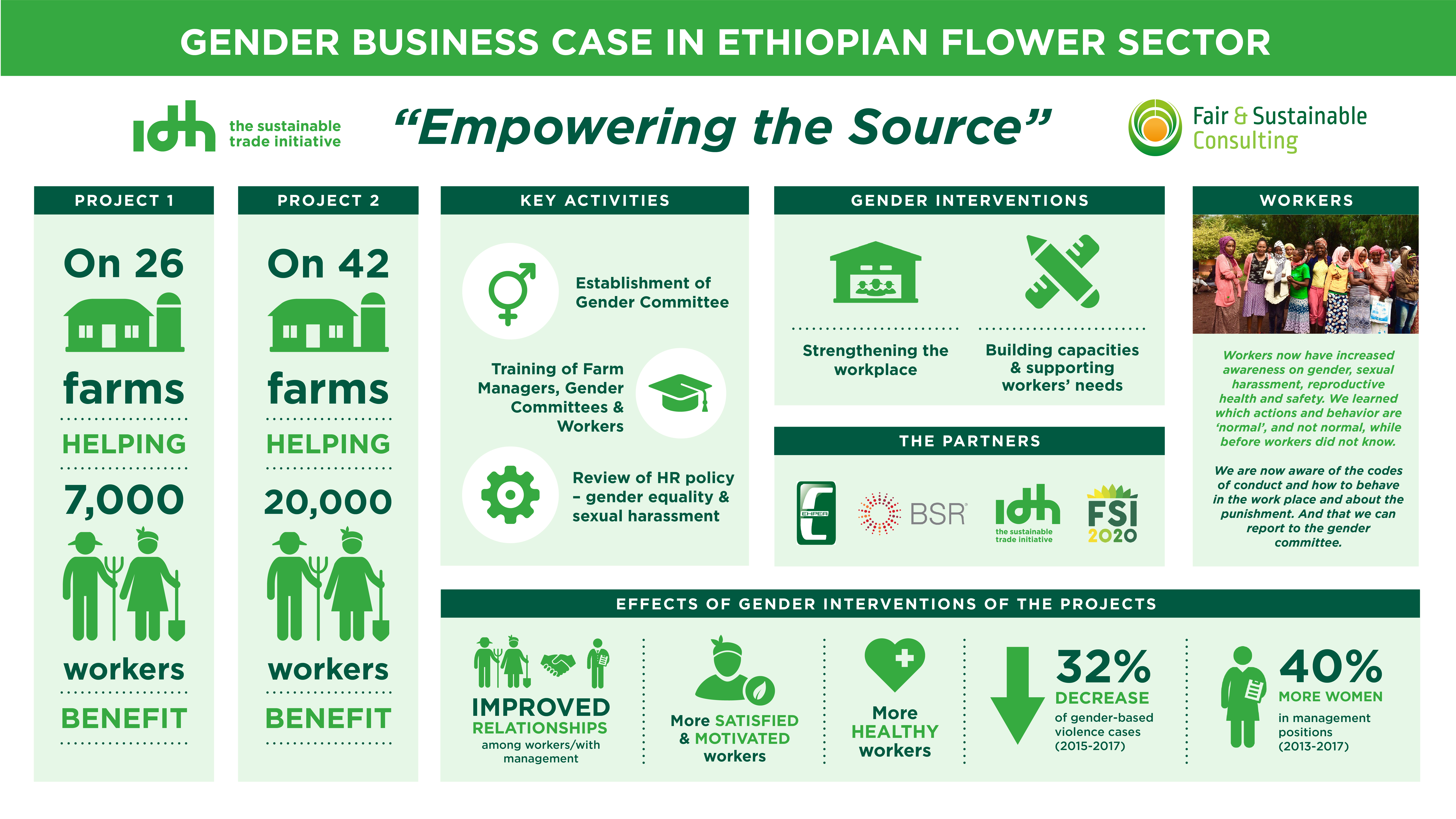Together with our partner Fair & Sustainable Consulting, we conducted research to test that gender interventions in Ethiopian flower farms have lead to satisfied workers leading to improved performance of the business. In the previous chapters we have highlighted the top 1o changes seen. A more detailed summary of the findings can be found below:
The gender interventions by the EHPEA projects were generally found relevant and effective. Establishing the Gender Committees, preferably with female and male members, and training of farm managers and gender committees were key activities with positive impact. The quality and completeness of the Gender & HR policies that were developed varied.
Significant Changes
- Improved labor conditions affecting women in particular, such as:
– allocation of breastfeeding time,
– maternity leave
- Improved health and safety affecting women in particular:
– reduction of reported Gender Based Violence cases. The initial rise of reported cases was probably related to the increased self-confidence. Aggregated data of 4 farms show the number of GBV cases decreased by 32% in 2017 compared to 2015.
– clothing, health care
- Improved gender relations and women friendly culture (awareness)
- Increased confidence and skills of women
- Improved relationship employees – management (through Gender Committee)
- Improved status and position of women ( access to income and employment , status in community)
Farm data show that the percentage of women in management positions increased from 26.3% to 36.7% (2013 to 2017), hence an increase of nearly 40%. Their total number more than doubled from 20 in 2013 (out of 76 total) to 44 in 2017 (out of 120).
A mix of gender interventions and other measures taken by the farms and undertaken by projects (EHPEA and others), as well as external factors, have contributed to the above mentioned changes.
Key causes
- Corporate leadership by farm owner/management towards gender and workers
- Establishing and strengthening gender committees
- Training and awareness raising on gender issues, and effective gender HR policies
- Increased attention for gender related issues in the government and international arena, including standard setting organizations.
- The role of EHPEA, supporting NGOs and unions were also mentioned as drivers for change. Since late 2014 EHPEA and the two phases of the Empower the Source program, supported by expert advice from BSR, have played a pivotal role in supporting the farm management on gender equality activities.
Other findings
- While farm managers stated that the farms have considerably reduced the use of chemicals and Integrated Pest Management was introduced in the last 3-5 years, the exposure to high amounts of chemicals was still highly rumored and has created tensions among workers and the surrounding communities.
- The use of safety cloth and tools improved (one of the MSCs), but it was also reported that part of the young male workers think the Personal Protection Equipment (PPE) is not fashionable and too warm to wear in the greenhouse.
- Lack of sufficient budget may hamper motivated gender committees to fulfill their role and implement their annual plans.
About the research
Fair & Sustainable Consulting is a consultancy firm and social enterprise specialized in value chain analysis and development. Fair & Sustainable has thorough on the ground experience on gender in agricultural value chains and CSR: research, development of tools and training for a wide array of clients, including IDH, GIZ, FAO, ICCO, HIVOS and AgriProFocus.
The Gender Business case research was conducted by team of Fair & Sustainable Consulting (Netherlands) and Fair & Sustainable Ethiopia consisting of Hibiete Tesfaye, Ayalew Abebe, Jingwei Ling and Jochem Schneemann (team leader) from February to August 2018, with a field mission in May 2018.


![Copy of IMG_8405[1]](https://www.idhsustainabletrade.com/uploaded/2018/11/Copy-of-IMG_84051-e1541777846414-1440x450-c-default.jpg?x25761&x25761)






